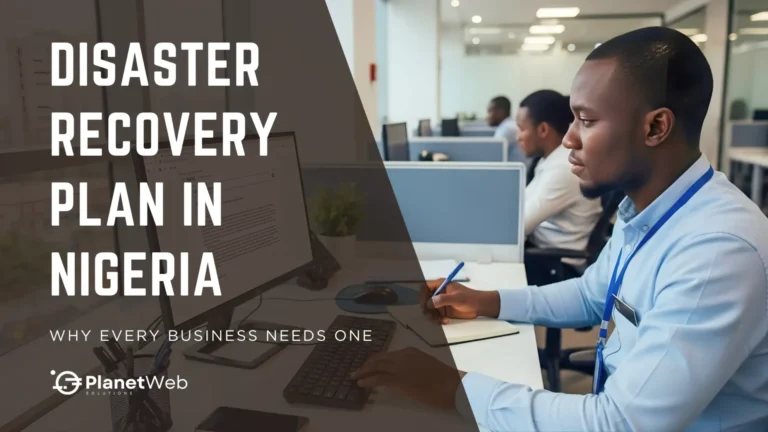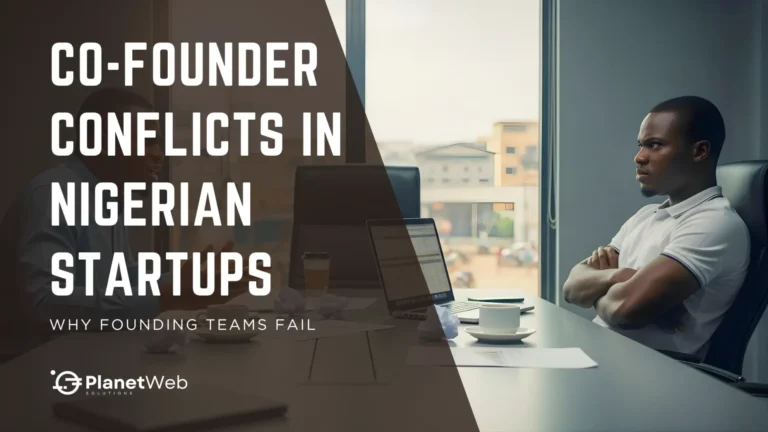Why Nigerian Businesses Break Down During Everyday Disruptions
When heavy rains flooded parts of Lekki last October, a small marketing agency suddenly found itself unable to operate. Staff couldn’t get to the office. Laptops were inside. Files were stored locally. No remote access configured. No shared communication channel beyond individual WhatsApp numbers. Clients were calling with urgent requests, but nobody had a clear plan for handling ongoing campaigns, approving spend, or delivering promised reports.
Nothing dramatic happened. No ransomware attack. No building fire. No hardware failure. Yet the business spent an entire week recovering from what should have been a manageable disruption over two days.
This is what business continuity planning in Nigeria is really about. Not rare, catastrophic disasters. The everyday disruptions that stop work abruptly and expose how dependent operations are on one office, one location, one person, or one vendor.
Most Nigerian companies prepare for server crashes and power outages. They rarely prepare for the reality that a single staff absence, a flooded road, or a vendor failure can halt operations completely. This article explains what business continuity planning actually means, why Nigerian businesses face unique continuity risks, and how to build operational resilience that works in real conditions.
What Business Continuity Planning Actually Means
Business continuity planning in Nigeria is your documented strategy for keeping critical business functions running during any disruption—whether that affects your people, places, processes, suppliers, or technology. While international standards like ISO 22301 provide frameworks for business continuity management, Nigerian businesses must adapt these principles to local realities.
Many Nigerian businesses confuse disaster recovery with business continuity. Your disaster recovery plan focuses on restoring IT systems after technology failures. Your business continuity plan addresses the broader question: how does the organization continue operating when anything disrupts normal operations?
Think of it this way:
A DRP brings your systems back.
A BCP keeps your business running.
A solid business continuity plan covers several key areas: figuring out what functions absolutely must continue, creating alternative ways to deliver when normal methods fail, clarifying who has authority when leaders are unavailable, planning how to keep staff and customers informed, identifying backup options for critical vendors, and determining where people work when offices are unavailable.
The goal isn’t preparing for dramatic crises. It’s building practical resilience for the predictable friction of running a business in Nigeria’s dynamic environment.
Why Nigerian Businesses Need This More
Nigerian businesses face operational friction that makes continuity planning more critical than in markets with stable infrastructure. According to the World Bank, infrastructure challenges significantly impact business operations across the country.
Power outages are expected. Fuel scarcity appears without warning. Flooding shuts down neighborhoods. Payment systems fail. Staff get stuck in traffic. Key people travel or fall ill. Vendors delay delivery. Internet outages spread across major ISPs.
Most companies hope things will return to normal quickly. But hope isn’t continuity.
Many Nigerian SMEs rely on single individuals. One staff member knows the banking tokens. One person manages vendor relationships. One person understands client histories. When that person is unavailable, operations freeze—not because technology failed, but because the organization never planned for their absence.
Vendor concentration creates additional risk. If your delivery partner, payment gateway, or supplier goes down, your business slows with them.
In countries with reliable infrastructure, continuity planning focuses on rare catastrophes. In Nigeria, continuity challenges happen regularly. You’re planning for everyday friction.
Most Nigerian SMEs improvise when disruptions occur. Businesses with proper continuity planning respond systematically. They maintain customer service, protect revenue, and demonstrate professionalism that builds trust.
What Operational Disruption Costs
When you can’t deliver because your logistics partner failed, that’s direct revenue loss. But the real damage extends beyond obvious revenue hits.
Nigerian business operates on trust and relationships. When you can’t respond to inquiries, miss commitments, or fail to provide updates during disruptions, clients remember. One poorly handled disruption affects not just current revenue but future opportunities.
Watch what happens when a key person becomes unavailable. Staff improvise. Mistakes happen. Customers receive inconsistent information. The chaos affects productivity for weeks.
Your competitors face the same challenges. Those who manage disruptions professionally win the customers you lose. Customers can tell the difference.
Disruptions to payment processing, invoicing, or collections create dangerous cash flow gaps. For businesses on thin margins—the majority of Nigerian SMEs, according to SMEDAN, a two-week delay in collecting receivables creates serious problems.
Single disruptions often cascade. Your primary vendor fails, so you rush to find alternatives, only to end up with quality issues. One gap creates multiple problems.
Building Business Continuity That Works in Nigerian Conditions
Business continuity planning in Nigeria needs to account for local infrastructure realities.
Start With Business Impact Analysis
The first step isn’t writing procedures or buying software. It’s clarity about what actually matters.
Ask yourself: “If this function stopped for 24 hours, would it cause immediate revenue loss or serious customer impact?” The answer separates truly critical operations from nice-to-have activities.
Once you know what matters most, figure out how long each critical function can be down before damage becomes permanent. For a logistics company, dispatch might tolerate a maximum of 4 hours. Monthly reporting can wait 72 hours. The specific timeframes matter less than being honest about your actual tolerances.
Look for your single points of failure. Which processes depend completely on one person? Which vendor relationships have no backup options?
Document Alternative Operating Procedures
Once you know what needs to continue, write down how to make that happen when normal operations fail. Be specific enough that someone could actually follow your instructions under pressure.
Instead of “contact backup logistics provider,” write: “If our primary logistics partner is unavailable, call Alternative Provider A at [phone number]. The Operations Manager authorizes the switch. If they’re unavailable, the General Manager can approve.” That level of detail makes the difference.
You’ll also need manual workarounds for when systems go down. If your inventory system crashes but the warehouse still needs to fulfill orders, what’s the backup process? Write it down now, while you’re thinking clearly.
Think about minimum viable operations too. What’s the absolute bare minimum your business must do to avoid permanent damage? For an e-commerce company: process orders, respond to inquiries, and keep the website running. Everything else can wait until things stabilize.
Establish Emergency Decision-Making Protocols
During disruptions, decisions shouldn’t wait for one person. Yet many Nigerian businesses have exactly that problem: everything freezes when the usual decision-maker is unreachable.
Define who can authorize what when normal chains break. “If the CFO is unavailable and we need urgent payment approvals, authority shifts to the General Manager up to ₦5 million.” Clear limits prevent both unauthorized decisions and paralysis.
Build contact escalation lists that work. Who do you call first when someone critical is unavailable? Who’s next if they don’t respond within 30 minutes? Use mobile numbers and WhatsApp. Update quarterly.
Make sure staff know their approval limits. A customer service lead should know they can approve refunds up to ₦50,000 without escalation. Clear boundaries let operations continue with appropriate control.
Build Vendor and Supplier Redundancy
Every Nigerian business knows single-vendor dependency is risky. Yet most operate exactly that way until a crisis forces change.
List vendors whose failure would immediately disrupt operations. Logistics partners. Payment processors. Key suppliers. Internet providers. For each one, ask: “If this vendor stopped operating tomorrow, how long before our business is affected?”
Then, actually qualify alternatives before you need them. Get quotes. Understand their capacity and lead times. For critical services, consider maintaining relationships with secondary vendors even if they cost slightly more. Think of it as insurance.
Write down how to activate these backup vendors. Who has the authority to make the switch? What information does the new vendor need?
Enable Remote Work Capabilities
Take an honest look at what can be done outside the office. Many Nigerian business leaders underestimate how much work can be done without a physical presence. Sales calls happen over the phone and video. Customer service operates through email and WhatsApp. Most administrative work just needs a laptop and the internet.
The challenge isn’t whether remote work is possible; it’s whether you’ve set it up properly. Do staff have laptops they can take home? Can they access needed systems? If you’re using Microsoft 365 or Zoho Workplace, remote access is straightforward. On-premise systems need VPN or secure remote access configured before disruptions hit.
Test this before you need it. Run a trial during a slow period. You’ll discover issues you can fix calmly, rather than scrambling during a crisis.
Plan for Nigerian connectivity realities. Can staff work using mobile data if home internet fails? Are critical files accessible offline?
Plan for Workspace Continuity
If flooding, building damage, or extended power outages make your office inaccessible, where do critical operations continue?
Write down your workspace alternatives: “If the main office is inaccessible, the Sales team works remotely with laptops and mobile data. Operations team relocates to [specific alternative location]. Customer service continues via WhatsApp Business and email.”
Think about physical dependencies too. Do certain operations require specialized equipment that is available only in your office? Are there legal documents or inventory samples that must be physically accessible? If these have no alternatives and your office becomes unreachable, those operations will stop.
BCP Quick-Start Checklist for Nigerian SMEs
If you’re starting business continuity planning, work through this:
Week 1: Assessment
- Identify your top 5 critical business functions
- List single points of failure (key people, vendors, knowledge)
- Note vulnerabilities where you have no backup
Week 2: Documentation
- Define who takes over when key people are unavailable (with contacts)
- Pre-qualify one backup vendor for each critical dependency
- Create an emergency contact list with mobile/WhatsApp numbers
- Document approval authorities for urgent decisions
Week 3: Enablement
- Configure remote access for critical staff
- Set up alternative payment methods
- Ensure critical files are accessible outside the office
- Identify alternative workspace options
Ongoing: Testing
- Run a remote-working drill quarterly
- Test one backup vendor annually
- Review the contact list every quarter
- Walk through disruption scenarios quarterly
Testing and Maintaining Your Continuity Plan
A continuity plan sitting in a drawer has zero value. You only know if it works by actually testing it.
Quarterly tabletop exercises work well. Gather your key people and walk through a scenario: “Our operations manager is unreachable, and we have urgent deliveries scheduled. What happens next?” You’ll quickly find problems with missing contact information, a lack of system access, and procedures that reference templates nobody can find. Fix these when discovering them doesn’t cost you actual business.
Test specific procedures too. Can staff actually work remotely? Try it during a slow week. Want to know if your backup vendor can handle urgent orders? Place a small test order and see how they perform.
After any actual disruption, review what worked and what didn’t. Update based on that experience immediately, while details are fresh.
Keep the plan current. New staff hired? Update contact lists. New vendors? Add them to your documentation. Review everything quarterly at a minimum.
Store your plan in a place that remains accessible during office disruptions. Cloud storage works. Multiple printed copies in different locations work. Keeping everything on a server inside an inaccessible office doesn’t work.
Real Scenarios Nigerian Businesses Face
Key staff suddenly unavailable: Your finance manager is hospitalized during the month-end. Without planning, nobody can access the banking system. With planning, alternative staff have procedures, credentials, and authorization to make payments.
Office inaccessible due to flooding: Victoria Island flooding makes your office unreachable for three days. Without planning, work stops. With planning, critical staff work remotely, and customers receive proactive communication.
Primary logistics partner stops operations: Your delivery partner experiences financial problems and stops accepting orders. Without planning, deliveries halt. With planning, backup providers are ready and can be engaged immediately.
Payment gateway extended outage: Your payment processor has a multi-day outage during peak sales. Without planning, sales stop. With planning, secondary payment methods are ready, and staff know how to process them.
These scenarios don’t require sophisticated technology. They require thinking through what happens when normal operations break and documenting alternatives. Businesses with continuity planning respond calmly. Businesses without it react chaotically. Customers can tell the difference.
When to Get Professional Help
Some vulnerabilities are obvious. Others only become visible when someone outside your daily operations examines your processes with fresh eyes.
At PlanetWeb, we help Nigerian businesses spot operational risks that often hide in plain sight, undocumented roles, critical processes depending on single individuals, vendor relationships with no backup options, and remote work capabilities that won’t work under real conditions.
We design continuity plans that fit how Nigerian businesses actually operate, not theoretical best practices from stable markets. These plans integrate with your disaster recovery approach and IT infrastructure strategy. Through our Managed IT Services, we conduct ongoing reviews to keep your plan up to date.
Operational Disruptions Are Inevitable. Your Response Doesn’t Have to Be Chaotic.
Running a business in Nigeria means accepting operational unpredictability. Infrastructure challenges are constant. Transportation issues affect logistics. Vendor reliability varies. Key people become unavailable. Payment systems have outages.
The businesses that handle these disruptions well have documented procedures for continuing to operate when normal processes break down. They’ve tested their workarounds. They’ve clarified decision authority.
Business continuity planning transforms reactive chaos into a systematic response. It dramatically reduces the impact on revenue, customer relationships, and operational effectiveness.
While competitors scramble, you’re executing documented procedures. While they’re losing customers, you’re maintaining service quality. While they’re explaining why they can’t deliver, you’re demonstrating reliability.
Start with an honest assessment. Where are you fragile? Document alternatives for critical functions. Test those alternatives. Refine based on experience.
Perfect plans aren’t the goal. Working plans that are better than improvisation—that’s what protects your business.
Ready to build operational resilience that works in Nigerian conditions? We can assess your vulnerabilities and design strategies that fit your reality.
Schedule a free business continuity assessment to start protecting your operations against everyday disruptions.






